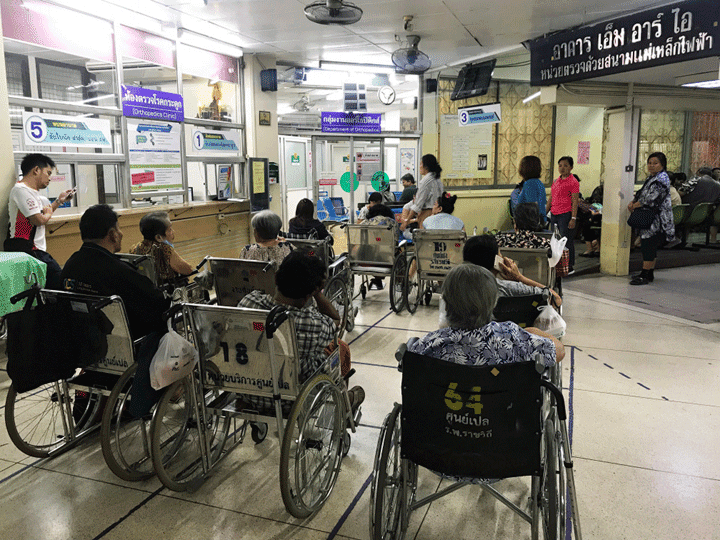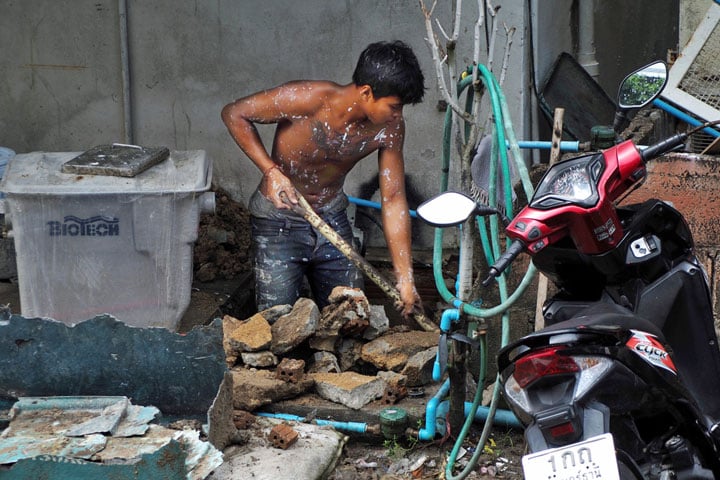
A government must be held accountable for its attention to the underprivileged, such as the poor, the homeless, the disabled, migrant workers and refugees. To draw attention to the problematic access of migrant workers to public health care in Thailand, I translated an article from news website Prachatai.
Expensive road to infirmary: Migrant workers struggle to access Thai public health care
Due to bureaucratic obstacles, foreign migrant workers are often unable to obtain social security cards, and thus access to Thai public health care.
A Mon family whose child was diagnosed with Hydrocephalus, a fluid buildup around the brain that can cause brain damage, is suffering through the grueling process of accessing public health insurance. Because their visas and work permits had expired, the parents were unable to get social security. A donation campaign also failed to raise enough money for medical expenses. Members of the Mon community in Surat Thani donated about 10.000 baht, but the operation costs nearly 100.000 baht.
After Maung Mon Chan, the child's father who works in Surat Thani, posted the story on Facebook, more than a dozen local organizations contacted the family.
The parents, who previously had work permits, became undocumented after being fired by their employer. They were unable to find a new job in time to enroll in the social security system. This is a system that gives employees and their dependents access to health care for injury, illness, maternity and disability, as well as death benefits.
The law states that migrant workers must have active passports and work permits in order to obtain social security cards. The cards cost THB 2.100 for adults and THB 365 for children under the age of seven. Because only legal, full-time workers are qualified, large numbers of foreign workers are left without coverage.
“This is more common than we think, especially in the agricultural sector,” says Assistant Prof Sudarat Musikawong, Professor of Sociology at the Institute for Population and Social Research, Mahidol University.
In the agricultural industry, workers are categorized as temporary seasonal or independent contractors. Since hiring full-time workers from Myanmar requires expensive visa and work permit documents, most employers avoid it. An economic rationale that affects migrant workers' access to health care.
“If you don't have legal status in this country, it's 10 times worse. You don't exist,” Sudarat added.

A Burmese migrant worker (Karnwela / Shutterstock.com)
Complicated public health system makes it more difficult
While migrant workers are allowed to apply for visas and work permits themselves, most choose to use the services of brokers who know how to handle the complex procedures involving multiple documents that must be submitted in a specific order.
“Many officials set additional conditions that can cause confusion and difficulties for applicants,” said Adisorn Kerdmongkol, a coordinator of Migrant Working Group (MWG), an NGO that focuses on migrant workers issues.
Maung Mon Chan paid a broker to get his passport and work permit to qualify for the social security card. The broker charged him 10.000 Thai baht, a rate much higher than the official price of 6.800 baht for both documents. Now he has already paid 8.000 baht and still has not received a public insurance card,” said Pago Man, 42, a worker from Myanmar and a close friend of the Mon family.
There is also a lot of confusion about which hospitals provide medical treatment. Migrant workers can only be treated in the hospital where they have purchased public health insurance. When employees change work locations, they must also go through the complicated process of changing their Social Security address.
Transactions covered by the social security card are listed on the webpage of the Ministry of Health. According to Adisorn, “many medical centers do not provide the listed care such as maternal care and the treatment of some chronic diseases.” Some hospitals also refuse to provide medical care within the price range supported by social security, forcing migrant workers to cover their own medical costs.
Pago Man recalls that his child once had surgery and needed medication that was not covered by the social security system, so he had to pay for it out of pocket. "I'm unlikely to ever get that money back," he said.

Migrant workers working in the fishing industry. Samut Songkram, Thailand. October 30, 2016
Discrimination and language barriers
“Not much information is available to migrant workers on how to access public health services. It has yet to be translated into their languages. As a result, migrant workers often don't have much information,” notes Adisorn. The process of applying for a Social Security card is quite complex. And it's even worse when the procedures are only described in Thai.
“If hospital providers cannot communicate well in the languages of migrant workers, they cannot explain the steps required to access medical treatment…it creates misunderstandings that are life-threatening,” says Sudarat.
In some cases, Myanmar workers also feel discriminated against by hospital staff. Some report being told that Social Security does not cover full medical costs. Sometimes hospitals charge extra when a patient needs more medication or needs to be hospitalized. With language barriers and little knowledge, employees have no choice but to pay the extra costs themselves.
As noted by Sudarat: “Healthcare has structural discrimination against undocumented migrants and then there is the language barrier. The Thai health care system … is unwilling to cover the costs of medical treatment for undocumented migrants.”
The Rak Thais Foundation, civil society organizations (CSOs) and non-governmental organizations (NGOs) can provide migrant workers with interpreters for hospital visits, but Sudarat says she is not sure how many hospitals work with these organizations.
“The system needs to be re-evaluated to address both the language capacity of hospital staff and the economic burden of border issues and the influx of undocumented workers. Together with those slipping out of legal status, they number in the millions,” said Sudarat.

(catastrophe_OL / Shutterstock.com)
Official collaboration
Despite a recent extension of the Social Security card registration period, employers are still required to submit documents on behalf of their employees. Migrant workers cannot complete the process alone.
Organizations such as Raks Thai and the Migrant Working Group have advocated for change and reform of social security and universal healthcare systems. They propose that Thailand adopt the standards of the International Labor Organization (ILO). They propose opening up the health registration system throughout the year so that every employee and their family, documented or otherwise, is eligible. Creating One Stop Service Centers in Thailand would also help accommodate migrant workers.
Reviewing some conditions could help reduce the difficulties and misunderstandings migrant workers face in accessing public health care. According to Adisorn, this should include a provision that insured migrant workers pay monthly social security contributions for at least three months in order to qualify for the insurance benefits.
“My feeling is that we need comprehensive reforms for low-wage workers from neighboring ASEAN countries,” says Sudarat. She believes that helping all workers to qualify and receive social security can help Thailand better integrate migrant workers across all sectors.


Yes Tino, a piece that leaves nothing to be desired and that shows that involvement, priority and humanity are not of paramount importance to many, but certainly to those who can and should do something about this. Other interests prevail, as in many areas and that is perceptible to those who are open to it.
The company where I work employs 50 Cambodians and 25 Myanmar nationals as well as a number of foreign managers.
All have the SS card and can therefore go to the hospital of their choice if that hospital accepts the SS card. Some medication is not covered by the SS and then you must either choose an alternative (less advised by the treating physician) or pay for it yourself.
This is the case, a legal obligation, for all employers, but there are of course Thai exceptions, the multinationals are put under a magnifying glass, so there is no escaping it for them. And rightly so.
But this piece talks a lot about undocumented foreigners, which is a status to which you cannot borrow an obligation. So it's hard to complain.
Too little too late;…..
You can take over the SS yourself as insurance, something I did myself on my first work break in 2013, if you lose your job in any way. The family in question could have done the same.
Perhaps not well informed rn/or not read or viewed the multilingual documentation (Khmer and Myanmar for sure) and TH/EN website
Much is going well with the migrant workers. The problems I often heard:
1 many do not receive the minimum wage but only about 250 baht
2 if they resign or are fired, which often happens to pregnant women, they lose their status with all the associated disadvantages. They are then basically undocumented, and must either quickly look for and find a new job or return to their home country.
3 The education of children of labor migrants is also often a major problem.
What do the migrant workers earn with you, Martin?
Every illegal foreigner who works in TH and gets into a problem has few rights. The rules are known and if you want to get around them then you shouldn't complain if it doesn't comply with the rules and certainly don't judge from the sidelines that there are also rights.
I rather believe Martin with his story than anyone who ever heard it years ago. Times are changing and if you do honest business then the legal migrant workers also have a Thai income with the extras that come with it.
Unfortunately, one of several minorities who fall victim to Thai bureaucracy, legislation and what appears to be a disdain for certain population groups. It is therefore good that media such as Prachatai draws attention to such matters. Who knows, a different wind will blow in Bangkok…